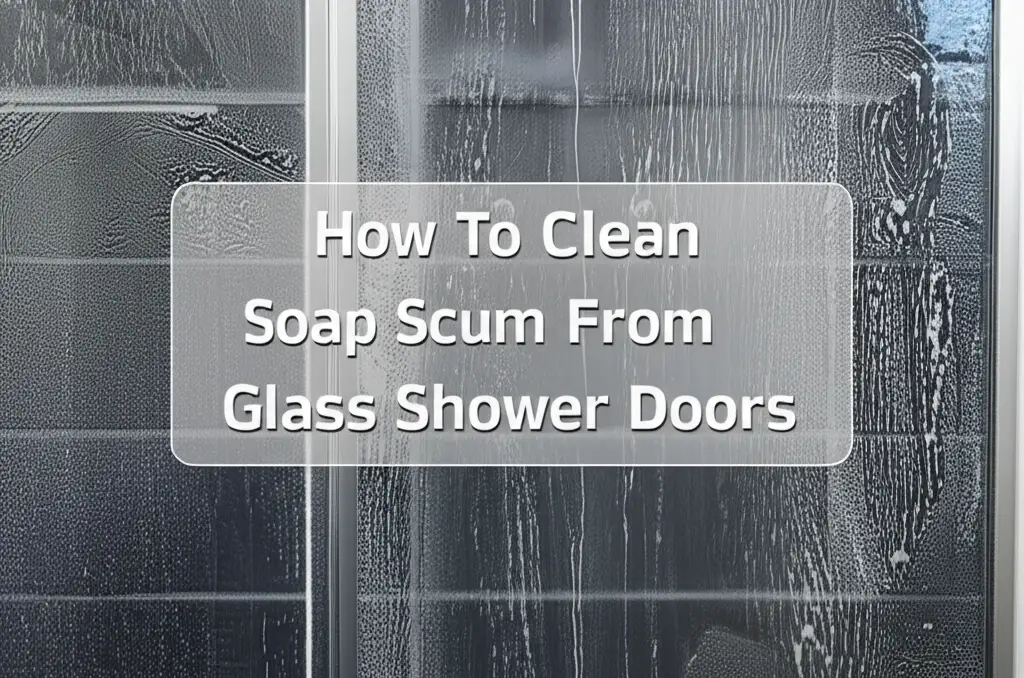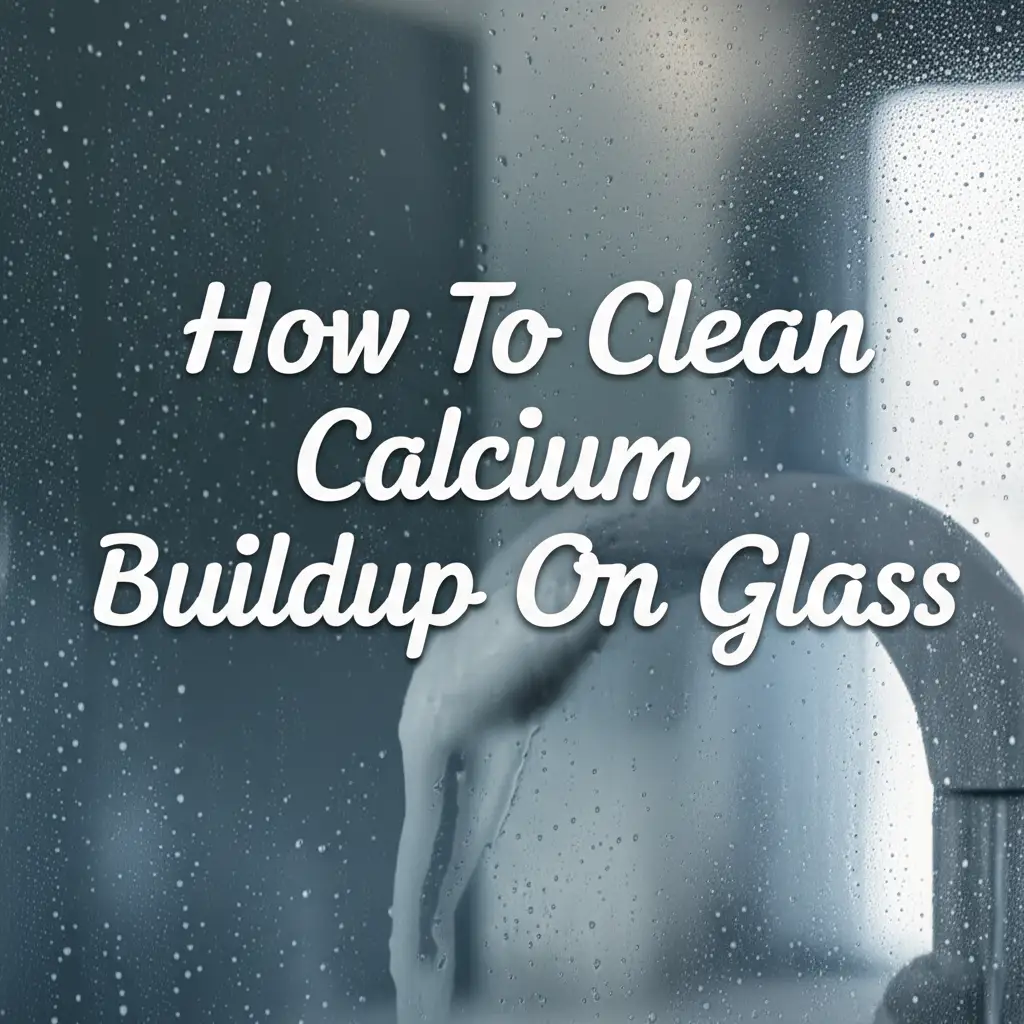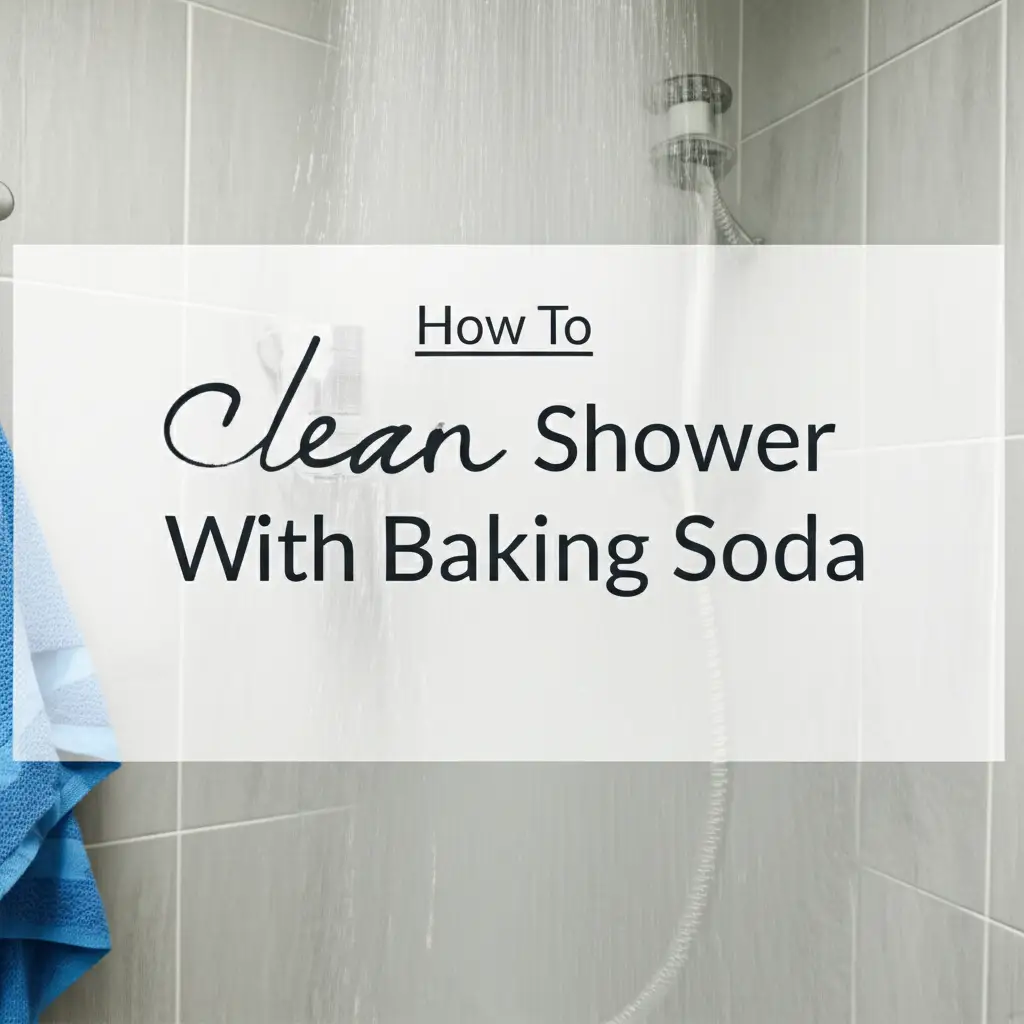· Home Cleaning · 19 min read
How To Clean Soap Scum From Glass Shower Doors

Your Guide to Cleaning Soap Scum from Glass Shower Doors
You open your shower door, ready for a refreshing cleanse, only to see cloudy, streaky glass. This common sight is soap scum, a frustrating film that builds up over time. It makes your bathroom look dull and unclean. Cleaning soap scum from glass shower doors does not need to be a difficult chore.
I know the struggle of trying to get those shower doors truly sparkling. This article will show you effective methods to eliminate soap scum. We cover natural home remedies and powerful commercial cleaners. You will learn how to clean glass shower doors and prevent future buildup. We aim to help you achieve a spotless, inviting shower space every time.
Takeaway
- Use common household items: Vinegar and baking soda are powerful soap scum fighters.
- Consider commercial products: Specialized cleaners tackle tough buildup effectively.
- Prevent future issues: Squeegee after each use and apply protective coatings.
- Maintain regularly: Consistent cleaning keeps soap scum from returning.
Soap scum forms when minerals in hard water react with ingredients in soap and body wash. To clean soap scum from glass shower doors, you must dissolve this mineral and soap residue. Methods include acidic cleaners like vinegar, abrasive pastes like baking soda, or specialized commercial products designed to break down the film.
Understanding Soap Scum: What It Is and Why It Forms
Soap scum is a common problem in many bathrooms. It appears as a white, cloudy film on your shower doors. This film is not just dirt; it is a chemical reaction. Understanding its origin helps you clean it better.
Soap scum forms when the fatty acids in bar soap or body wash mix with minerals in hard water. Water contains dissolved minerals like calcium and magnesium. These minerals react with soap to create a sticky, insoluble residue. This residue then adheres to surfaces like glass shower doors. It also sticks to tiles and fixtures.
The Chemistry Behind the Buildup
Our tap water often contains dissolved minerals. We call this “hard water.” When this hard water mixes with soap, a chemical reaction occurs. This reaction creates precipitates, which are solid particles. These solid particles do not dissolve in water. Instead, they stick to surfaces, forming that unsightly film.
Hard water is the main culprit in this reaction. The more minerals in your water, the faster soap scum builds up. Regular cleaning is important to prevent thick layers. If you live in an area with very hard water, you will notice this film forms quickly. You may also see it on faucets or sinks.
Common Areas Affected by Soap Scum
Glass shower doors are prime targets for soap scum buildup. Water splashes on them during every shower. The water then dries, leaving mineral deposits behind. These deposits combine with soap residue. The clear glass shows the film very clearly.
Other areas affected include shower walls, tiles, and even shower curtains. Anywhere water and soap combine regularly can develop soap scum. This sticky film can also trap dirt and mildew, making the problem worse. Addressing it promptly keeps your bathroom cleaner overall.
Natural & DIY Solutions for Soap Scum Removal
You do not always need harsh chemicals to clean soap scum. Many effective solutions use common household items. These natural methods are safe and eco-friendly. They can make your glass shower doors shine again.
Vinegar: Your Acidic Ally
White vinegar is a powerful cleaner for soap scum. Its acidic nature helps dissolve the mineral deposits. I find it works well for regular maintenance and light buildup. You can use it in a spray bottle.
Mix equal parts white vinegar and water in a spray bottle. Spray the solution generously onto your glass shower doors. Let it sit for 15-30 minutes. The vinegar needs time to break down the scum. For tougher spots, you can warm the vinegar slightly before mixing. Warming makes it more effective. After soaking, scrub with a soft brush or non-scratch sponge. Rinse thoroughly with clean water. I often use a squeegee to dry the glass afterward.
Baking Soda: The Gentle Abrasive
Baking soda is another excellent natural cleaner. It acts as a mild abrasive without scratching glass. It also helps to neutralize odors. Combining it with vinegar creates a powerful fizzing action.
Make a paste with baking soda and a small amount of water. Apply this paste directly to the soap scum. Use a non-scratch sponge or cloth to rub it onto the glass. You can also mix baking soda with vinegar for extra power. Spray vinegar first, then apply baking soda paste. Let it fizz for a few minutes. Then, scrub gently and rinse. This combination tackles tougher stains effectively. For more DIY cleaning tips, check out our guide on how to clean grout in the shower.
Lemon Juice: Fresh and Effective
Lemon juice offers another acidic option for cleaning soap scum. It works similarly to vinegar but leaves a fresh scent. You can use it alone or in combination with other ingredients. I love the clean smell it leaves behind.
Squeeze fresh lemon juice directly onto the affected areas. You can also mix it with baking soda to create a paste. Apply the lemon juice or paste to the glass shower doors. Let it sit for about 10-15 minutes. The natural acids will begin to break down the soap scum. Scrub the surface gently with a soft cloth or sponge. Rinse well with water. This method is great for light buildup and leaves your bathroom smelling pleasant.
Commercial Cleaners & Specialized Products
Sometimes, natural remedies are not enough for very stubborn soap scum. In these cases, commercial cleaners offer a strong solution. Many products are specifically formulated to tackle tough hard water stains and soap scum. They contain ingredients designed to dissolve these mineral and soap deposits quickly.
Choosing the Right Commercial Cleaner
When selecting a commercial cleaner, look for products designed for bathroom use. Many cleaners specify “soap scum remover” or “hard water stain remover” on their labels. Common active ingredients include acids like phosphoric acid or hydrochloric acid. Some products use powerful surfactants that lift and dissolve grime. Always read the product label carefully before buying. Make sure it is safe for glass surfaces.
I always recommend testing a small, inconspicuous area first. This checks for any adverse reactions or damage to your shower door. Different glass types or coatings might react differently to certain chemicals. A quick test prevents any accidental damage. Follow the manufacturer’s instructions for application.
Popular Commercial Cleaner Types
- Spray-on Cleaners: These are convenient and easy to use. You simply spray, let it sit, and wipe. Brands like Tilex, Clorox, and Kaboom offer effective spray formulas. They are good for regular use and moderate buildup.
- Foaming Cleaners: Foaming action helps the product cling to vertical surfaces. This allows for longer contact time. It works well on shower walls and doors. The foam often provides a visual indicator of where you have applied the cleaner.
- Gels or Pastes: For very heavy soap scum, a thicker gel or paste can be more effective. These products stick to the surface and provide concentrated cleaning power. You apply them, let them sit, and then scrub. They are often used for deep cleaning.
- Specialized Hard Water Removers: Some products focus specifically on hard water mineral deposits. These are excellent if your soap scum problem is mainly due to hard water. They often contain stronger acids.
When using commercial cleaners, ensure good ventilation. Open windows or turn on the bathroom fan. Wear gloves to protect your hands from chemicals. Always rinse thoroughly after cleaning. Proper rinsing prevents residue from being left behind. This helps keep your glass clear and sparkling.
Advanced Techniques for Stubborn Soap Scum
Some soap scum buildup is incredibly tough. It can be years of hardened mineral and soap deposits. For these challenging cases, you need more aggressive methods. These advanced techniques can restore even the cloudiest glass shower doors. Always proceed with caution when using these stronger methods.
Using a Razor Blade Scraper
A razor blade scraper is very effective for truly stuck-on soap scum. This method requires careful handling. You need a sturdy scraper with a fresh, sharp blade. I use this method only for extreme buildup.
Hold the scraper at a shallow angle, almost flat against the glass. Carefully push the blade across the glass surface. Use even, gentle pressure. You will see the soap scum lift off in ribbons. Work in small sections. Do not press too hard, as this can scratch the glass. Always keep the blade wet with water or a cleaning solution to help it glide. This also prevents scratching. Be extremely careful around the edges of the glass and any seals. This method is not suitable for textured or frosted glass.
Melamine Foam Erasers (Magic Erasers)
Melamine foam erasers are surprisingly effective for light to moderate soap scum. They work like very fine sandpaper. These erasers are excellent for buffing away residues. They are simple to use and do not require chemicals.
Dampen the melamine foam eraser with water. Gently rub the eraser over the soap scum. You will see the scum start to disappear. The foam wears down as it cleans, just like a pencil eraser. Use light to moderate pressure. These erasers are good for reaching small corners and edges. They are less aggressive than a razor blade but still very effective. They can leave behind a fine residue that needs to be rinsed off.
Steam Cleaning for Deep Penetration
Steam cleaners offer a chemical-free way to tackle soap scum. The hot steam loosens and melts the hardened deposits. This makes them easier to wipe away. A steam cleaner is a versatile tool for many cleaning tasks.
Fill your steam cleaner with distilled water. Allow it to heat up completely. Direct the steam nozzle at the soap scum on your glass door. Move the nozzle slowly over the affected areas. You will see the scum start to soften and dissolve. Use a microfiber cloth to wipe away the loosened residue. For really thick layers, you might need to repeat the steaming. Steam cleaning is safe for most glass types and helps disinfect surfaces too. It leaves no chemical residue behind.
Polishing with Car Wax or Rain-X
After cleaning, applying a protective layer can make future cleaning easier. Car wax or automotive rain repellent products like Rain-X create a smooth, water-repellent surface. This prevents soap scum from sticking. I use this trick to keep my doors clear longer.
Ensure your glass shower doors are completely clean and dry first. Apply a thin, even coat of car wax or Rain-X to the glass. Follow the product instructions for application and drying time. Buff the surface with a clean microfiber cloth until clear. The coating creates a barrier. Water beads up and rolls off, taking soap and mineral residue with it. Reapply every few months for best results. This small step saves a lot of cleaning effort later. You can learn more about sealing surfaces in our guide to sealing granite countertops.
Preventing Soap Scum Buildup: Proactive Measures
The best way to deal with soap scum is to prevent it from forming. Proactive measures can save you a lot of cleaning time. Incorporating simple habits into your routine keeps your glass shower doors clear. Prevention is always easier than a deep clean.
Squeegee After Every Shower
This is perhaps the most effective prevention method. After every shower, take a squeegee and wipe down the glass doors. This removes water droplets before they can dry and leave mineral deposits. I keep a squeegee hanging inside my shower for easy access.
Start from the top and work your way down. Overlap each stroke slightly. Wipe the squeegee blade clean with a cloth between strokes. This simple step takes less than 30 seconds. It significantly reduces the amount of soap scum buildup. Consistent use makes a huge difference.
Daily Wipe-Downs with a Microfiber Cloth
If squeegeeing is not possible, a daily wipe-down is a good alternative. Keep a clean microfiber cloth handy in your bathroom. After showering, quickly wipe down the glass doors. This removes surface water and light residue.
A microfiber cloth is excellent for this purpose. It absorbs water effectively and leaves no lint. This small habit takes only a minute or two. It prevents water spots and soap residue from hardening. This helps maintain the clarity of your glass.
Use Liquid Soap Instead of Bar Soap
Bar soap often contains tallow or other fats. These ingredients react with hard water minerals to form soap scum. Liquid body washes or shower gels are formulated differently. They are less likely to create the same sticky residue.
Switching from bar soap to liquid alternatives can reduce soap scum buildup. Liquid soaps rinse away more cleanly. This simple change can make a noticeable difference on your glass doors. It is an easy way to minimize the problem at its source.
Apply Water Repellent Coatings
Applying a water repellent coating to your glass shower doors can be a game-changer. Products like Rain-X or specialized glass coatings create a hydrophobic surface. This means water beads up and rolls off the glass easily. Soap scum and mineral deposits have nothing to cling to.
Apply these coatings every few months. Follow the product instructions carefully. Ensure the glass is perfectly clean and dry before application. These coatings make it much harder for soap scum to form. They also make any existing grime easier to clean off. This creates a lasting protective barrier.
Install a Water Softener
For homes with very hard water, a water softener is the ultimate solution. A water softener removes minerals like calcium and magnesium from your water supply. This prevents hard water stains and soap scum from forming throughout your home. It benefits all your water-using appliances too.
Installing a water softener is a significant investment. However, it provides a long-term solution to hard water problems. It not only reduces soap scum but also extends the life of your plumbing fixtures. This option is worth considering if you consistently struggle with hard water issues. Learn more about the benefits of soft water for your home cleaning.
Maintaining Crystal Clear Glass Doors: Daily & Weekly Routines
Keeping your glass shower doors spotless requires consistent effort. A regular cleaning schedule prevents soap scum from becoming a major problem. Establishing daily and weekly routines will save you time and effort in the long run. Small, frequent actions are more effective than infrequent, deep cleans.
Daily Maintenance: The Quick Wipe Down
The most important daily task is to remove water and soap residue immediately after showering. This prevents the initial formation of soap scum. I make sure to do this every time. It takes very little time.
- Squeegee Usage: After your shower, use a good quality squeegee to wipe down all glass surfaces. Start at the top and move downwards in overlapping strokes. Wipe the squeegee blade clean after each pass.
- Microfiber Cloth Wipe: If you don’t have a squeegee, keep a dry microfiber cloth in the bathroom. Give the glass a quick wipe down to absorb excess water. This helps prevent water spots from drying on the surface.
- Ventilation: Always run the bathroom fan or open a window during and after your shower. Reducing humidity helps the glass dry faster. This prevents mineral deposits from settling.
Weekly Cleaning: Light Scum Removal
Even with daily maintenance, some light residue can accumulate. A weekly cleaning session helps address this before it hardens. This weekly clean is quicker if you have done your daily steps.
- Vinegar Spray: Mix equal parts white vinegar and water in a spray bottle. Spray the entire glass door surface. Let it sit for 5-10 minutes.
- Gentle Scrub: Use a non-scratch sponge or soft brush to gently scrub the glass. Focus on any areas where you see slight cloudiness.
- Rinse and Dry: Rinse the doors thoroughly with clean water. Then, squeegee or wipe them dry with a clean microfiber cloth. This prevents new water spots.
- Check for Spots: Look for any persistent spots. You can use a bit of baking soda paste for these areas. Apply, gently scrub, then rinse.
Monthly Deep Clean: Tackling Stubborn Residue
Once a month, dedicate a bit more time to a thorough cleaning. This ensures that no stubborn soap scum takes hold. This is when you can use stronger methods if needed. I find this keeps my doors looking brand new.
- Heavy-Duty Cleaner: Use a commercial soap scum remover or a stronger vinegar-baking soda paste. Apply according to instructions. Let it dwell for the recommended time, perhaps 20-30 minutes.
- Scrubbing Power: Use a scrub brush or a melamine foam eraser for extra scrubbing power. Focus on edges and corners where residue tends to build up.
- Blade Scrape (If Needed): If you have very stubborn, built-up areas, carefully use a razor blade scraper. Remember to keep the glass wet. Scrape at a shallow angle.
- Thorough Rinse and Polish: Rinse the doors completely. Squeegee them dry. Consider applying a water repellent coating like car wax or Rain-X. This will make daily and weekly cleaning easier for the next month. It creates a protective layer.
By following these routines, you can keep your glass shower doors crystal clear. Consistency is the key to preventing major soap scum problems. This makes your bathroom a more inviting and cleaner space.
Safety Tips and Best Practices When Cleaning
Cleaning soap scum can involve chemicals and tools. It is important to prioritize your safety. Following best practices protects you and your bathroom surfaces. Always be mindful when working with cleaning agents or sharp objects.
Ensure Adequate Ventilation
When using any cleaning product, especially commercial ones, ventilation is crucial. Many cleaners emit fumes that can irritate your respiratory system. Good airflow helps disperse these fumes quickly. I always open a window or turn on the exhaust fan.
- Open Windows: If possible, open all windows in the bathroom.
- Use Exhaust Fan: Turn on your bathroom’s exhaust fan before you start cleaning. Keep it running during the process and for some time afterward. This removes chemical odors and prevents humidity buildup.
Protect Your Hands and Eyes
Chemicals in cleaning products can be harsh on your skin and eyes. Wearing protective gear is a simple step that makes a big difference. I never clean without my gloves.
- Wear Gloves: Always wear rubber or latex gloves. This protects your hands from chemical irritation and dryness.
- Eye Protection: Consider wearing safety goggles or glasses. This prevents accidental splashes of cleaning solutions from entering your eyes.
Test Cleaning Solutions on a Small Area
Before applying any new cleaning solution to your entire shower door, test it. Some cleaners can react differently with various glass types or coatings. An inconspicuous area prevents potential damage.
- Choose a Hidden Spot: Select a small, out-of-the-way section of your glass door. This could be a bottom corner or near a hinge.
- Apply and Observe: Apply a small amount of the cleaner. Let it sit for the recommended time. Rinse it off. Check for discoloration, cloudiness, or other adverse effects. Only proceed if the test area looks good.
Avoid Mixing Cleaning Products
Mixing different cleaning products can be extremely dangerous. Certain combinations create toxic gases. For example, never mix bleach with ammonia-based cleaners or vinegar. This creates dangerous chlorine gas. I always stick to one product at a time.
- Read Labels: Always read the ingredient labels of your cleaners.
- Rinse Thoroughly: If you switch products, rinse the surface completely. This removes all traces of the previous cleaner. Ensure no residue remains before applying a different product.
Use Non-Abrasive Tools
While some advanced techniques use abrasive tools like razor blades, exercise caution. For general cleaning, use tools that will not scratch your glass. Scratches can make soap scum stick even more.
- Soft Sponges and Cloths: Use microfiber cloths, soft sponges, or nylon brushes. These are gentle on glass surfaces.
- Avoid Steel Wool: Never use abrasive scrubbers like steel wool or harsh scouring pads. These will scratch glass.
- Squeegee Care: Ensure your squeegee blade is clean and smooth. A worn or dirty blade can leave streaks or scratch the glass.
Following these safety tips ensures a successful and safe cleaning experience. You can achieve sparkling clean glass shower doors without putting yourself at risk.
FAQ Section
Q1: What causes soap scum on glass shower doors?
A1: Soap scum forms when minerals in hard water react with the fatty acids found in bar soaps and body washes. This reaction creates an insoluble, sticky residue. This residue then adheres to surfaces like glass shower doors. The more minerals in your water, the quicker soap scum will build up.
Q2: Is vinegar safe to use on all types of glass shower doors?
A2: White vinegar is generally safe for most glass shower doors. However, be cautious if your doors have special coatings, like anti-spot or easy-clean treatments. Vinegar’s acidity might degrade these coatings over time. Always test vinegar on a small, hidden area first to check for any adverse effects before full application.
Q3: How often should I clean my glass shower doors to prevent soap scum?
A3: For best results, use a squeegee or wipe down your glass shower doors after every single shower. This daily habit prevents initial buildup. For a deeper clean, aim for a weekly session with vinegar or a mild cleaner. A thorough deep clean once a month will tackle any stubborn spots that may have accumulated.
Q4: Can I use dish soap to clean soap scum?
A4: Dish soap can help clean general grime, but it is not highly effective against the mineral deposits in soap scum. Dish soap itself is a surfactant and can even contribute to new scum if not rinsed completely. For true soap scum, an acidic cleaner like vinegar or a dedicated commercial product works better.
Q5: What is the best way to prevent soap scum in hard water areas?
A5: In hard water areas, a multi-pronged approach is best. Use a squeegee after every shower. Consider switching from bar soap to liquid body wash, as liquid soaps contain fewer hard-to-rinse fats. Applying a water-repellent coating like car wax or Rain-X can also help water bead off. Installing a whole-house water softener is the most effective long-term solution.
Q6: Can I use a Magic Eraser on glass shower doors?
A6: Yes, a melamine foam eraser, often known as a “Magic Eraser,” can be used on glass shower doors. It works by acting as a very fine abrasive. Dampen the eraser with water and gently rub it over the soap scum. It is effective for light to moderate buildup but can leave a fine residue that needs rinsing.
Conclusion
Cleaning soap scum from glass shower doors does not have to be a frustrating battle. We have explored various effective methods, from simple natural remedies like vinegar and baking soda to powerful commercial solutions. Understanding what causes soap scum helps you choose the right approach. More importantly, consistent prevention is key.
By incorporating daily habits such as squeegeeing after each shower and weekly cleaning, you can significantly reduce buildup. Consider proactive measures like water-repellent coatings or even a water softener for lasting clarity. Remember to always prioritize safety by ensuring ventilation and wearing protective gear. With these strategies, you can maintain sparkling, crystal-clear glass shower doors. Reclaim the pristine look of your bathroom. Start your journey to a cleaner shower today!
- soap scum removal
- glass shower cleaner
- bathroom cleaning tips
- hard water stains
- shower door cleaning
- DIY cleaning
- home maintenance




